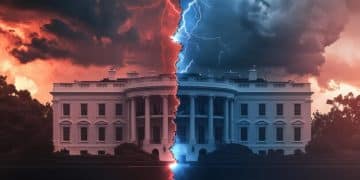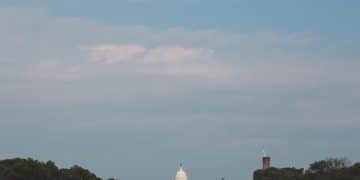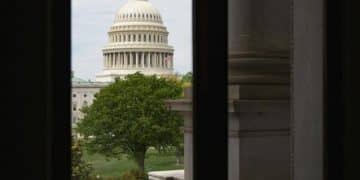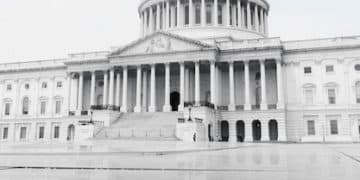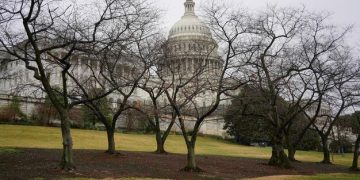How Political Polarization Will Reshape US Congress in 2025
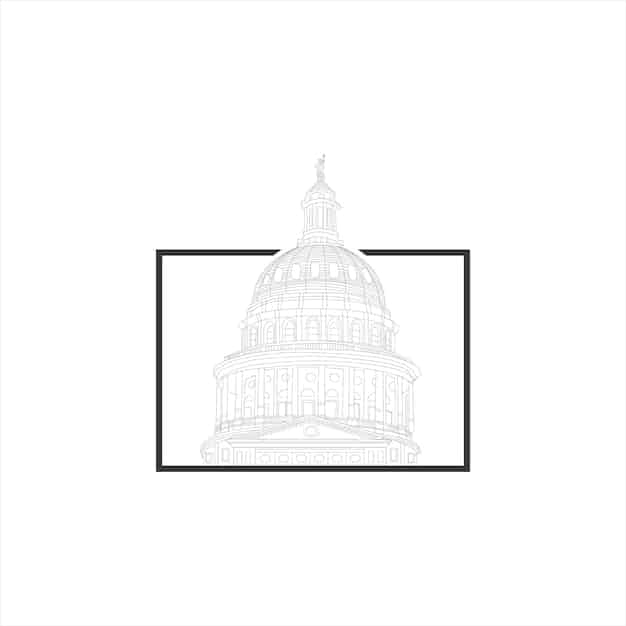
Increasing polarization could significantly obstruct legislative progress in the US Congress by 2025, potentially leading to more gridlock, heightened partisan conflict, and fewer bipartisan compromises, impacting the passage of key legislation and the confirmation of presidential appointments.
As the United States heads towards 2025, a crucial question looms over its political landscape: how will the increasing polarization affect the functioning of the US Congress in 2025? This escalating divide threatens to cripple legislative processes and exacerbate partisan tensions.
The Rising Tide of Political Division
Political division in the United States has been on the rise for decades, but recent years have seen an acceleration of this trend. Understanding the factors contributing to this polarization is essential to grasping its potential impact on the US Congress.
Historical Context
The roots of political polarization can be traced back to several key historical events and shifts in the political landscape. These include the Civil Rights Movement, the realignment of the Democratic and Republican parties, and the rise of conservative media.
Factors Fueling the Divide
Several factors contribute to the increasing polarization of American politics. These include:
- Media Fragmentation: The proliferation of partisan news outlets and social media allows individuals to consume information that reinforces their existing beliefs, leading to echo chambers and further entrenching political divides.
- Geographic Sorting: Americans are increasingly choosing to live in communities with like-minded individuals, leading to a separation of political views and a lack of exposure to opposing perspectives.
- Electoral System: The winner-take-all electoral system incentivizes partisan mobilization and discourages moderation, as candidates often need to appeal to their base to win elections.
- Rise of Identity Politics: As social and cultural issues become increasingly politicized, individuals’ identities and values are often tied to their political affiliations, making compromise more difficult.
Ultimately, the current climate of deep political division presents numerous challenges to the effective functioning of the US Congress. We must consider what this future looks like.

Potential Impacts on Legislative Processes
The growing polarization of American politics is likely to have a significant impact on the functioning of the US Congress. As political divides deepen, the prospects for bipartisan cooperation and compromise diminish, potentially leading to legislative gridlock and instability.
Increased Partisan Gridlock
One of the most significant consequences of increasing polarization is the potential for increased partisan gridlock. As members of Congress become more entrenched in their respective political camps, it becomes more difficult to find common ground and reach agreements on key legislative priorities.
Challenges to Bipartisan Cooperation
The current political climate poses several challenges to bipartisan cooperation. These include:
- Erosion of Trust: As partisan animosity increases, members of Congress may become less willing to trust and work with their counterparts across the aisle.
- Pressure from Party Activists: Members of Congress often face pressure from party activists and interest groups to adhere to strict party lines, making it more difficult to compromise.
- Limited Social Interaction: The decline in social interaction between members of Congress from different parties can further exacerbate partisan divisions and make it more difficult to build relationships and find common ground.
In conclusion, the escalating divides could result in legislative paralysis and the inability to address pressing national challenges.
Impacts on Congressional Committees and Oversight
The effects of intensifying polarization extends beyond floor debates, deeply influencing the inner workings of congressional committees. This has serious implications for the meticulous tasks of drafting legislation, conducting essential oversight, and ultimately, guiding the functions of the government.
Committee Dynamics and Effectiveness
Congressional committees, traditionally forums for detailed policy work and expert deliberation, increasingly reflect the partisan divisions that plague the broader Congress. The collaborative atmosphere vital for effective policymaking is often replaced by contentious debate.
The Decline of Oversight Function
The oversight function, crucial for holding the executive branch accountable, is often curtailed by partisan allegiance. Here are some dangers:
- Investigations can become tools to score political points rather than seeking genuine accountability.
- Partisan lines can undermine investigations of administrations
- The pursuit of truth becomes secondary to party protection.
Such actions impact governance profoundly, eroding public trust and potentially enabling corruption or inefficiency within the government.
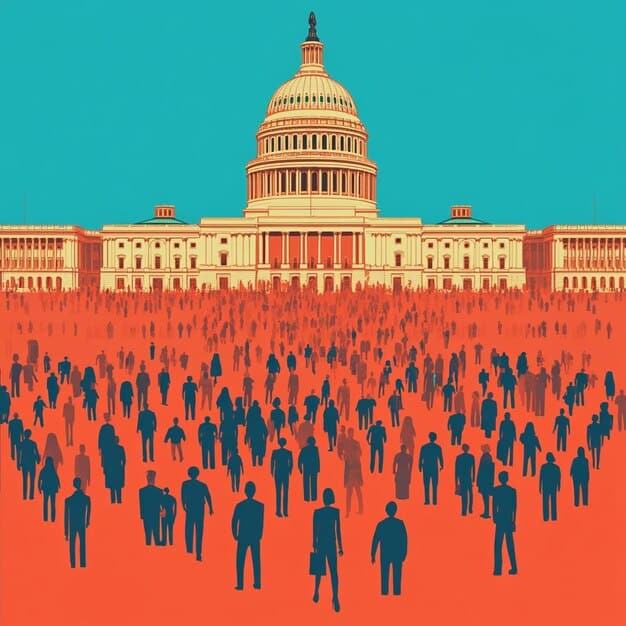
Impact on Judicial and Executive Nominations
Beyond legislation, polarization is having a pronounced effect on the confirmation processes for judicial and executive nominees. The heightened political stakes influence how candidates are assessed and ultimately whether they can secure approval.
Judicial Nominations
The confirmation of Supreme Court and lower court judges represents a particularly contentious battleground, with nominations often sparking intense partisan fights. This reflects heightened concerns over the ideological direction of the judiciary and the perceived consequences of judicial decisions.
Executive Nominations
Executive nominations, encompassing individuals selected to lead various federal agencies and departments, are also increasingly subject to partisan scrutiny. Delays in confirming these nominees can impede the functioning of government and undermine the President’s ability to implement their agenda.
Long-Term Consequences
The long-term consequences of sustained political polarization on the US Congress are far-reaching and pose significant risks to the stability and effectiveness of American democracy. Understanding these consequences is essential for addressing the underlying causes of polarization and mitigating its negative impacts.
Erosion of Public Trust
One of the most concerning consequences of increasing polarization is the erosion of public trust in government institutions. As Congress becomes more dysfunctional and partisan, Americans may lose faith in the ability of their elected officials to address the nation’s challenges.
Challenges to Governance
Sustained political polarization can create significant challenges for governance. These include:
- Policy Instability: Frequent policy reversals and gridlock can create uncertainty and hinder long-term planning.
- Difficulty Addressing Complex Issues: Polarization can make it difficult to address complex issues that require bipartisan cooperation, such as climate change, healthcare reform, and immigration.
- Increased Social Division: Political polarization can exacerbate social divisions and undermine social cohesion, leading to increased tensions and conflicts within society.
Potential for Political Instability
Ultimately, unchecked political polarization could threaten the stability of American democracy. As political divisions deepen, the potential for political violence and extremism increases, as does the risk of institutional breakdown and democratic backsliding.
Strategies for Mitigating the Impact of Polarization
Addressing the challenges posed by political polarization requires a multifaceted approach that involves reforms to the political system, changes in media consumption habits, and efforts to promote dialogue and understanding across political divides. While there are no easy solutions, several strategies offer promise for mitigating the impact of polarization on the US Congress.
Promoting Electoral Reform
Reforms to the electoral system can help reduce partisan polarization and encourage moderation. These include:
- Ranked-Choice Voting: Ranked-choice voting allows voters to rank candidates in order of preference, rather than simply voting for one candidate, which can lead to more moderate outcomes.
- Nonpartisan Redistricting: Nonpartisan redistricting commissions can help prevent gerrymandering, which can create safe seats for incumbents and reduce competition.
Encouraging Media Literacy
Promoting media literacy can help individuals critically evaluate information and avoid falling prey to partisan propaganda. This includes teaching individuals how to identify bias, verify sources, and engage in civil discourse.
Fostering Dialogue and Understanding
Creating opportunities for dialogue and understanding across political divides can help bridge partisan divides and build common ground. This includes organizing community forums, facilitating interfaith dialogues, and promoting civic education.
| Key Point | Brief Description |
|---|---|
| 🗳️ Increased Gridlock | Legislative process hampered by partisan disagreements, affecting policymaking. |
| ⚖️ Judicial Nominations | Confirmation of judges becomes highly politicized, causing lengthy delays. |
| 📰 Media Influence | Echo chambers reinforce beliefs, deepening political divides and affecting debate. |
| 🤝 Bipartisan Solutions | Strategies exist to reduce polarization, including electoral reform and dialogue. |
Frequently Asked Questions
▼
Political polarization refers to the divergence of political attitudes toward ideological extremes. It impacts governance significantly, particularly in legislative bodies like the US Congress.
▼
Polarization often leads to legislative gridlock as parties find it difficult to compromise and agree on policies, slowing down or halting the law-making process.
▼
Yes, reforms like ranked-choice voting and nonpartisan redistricting can encourage moderation by incentivizing candidates to appeal to a broader base.
▼
Media fragmentation and partisan news sources can exacerbate polarization by reinforcing existing beliefs and limiting exposure to diverse perspectives.
▼
Strategies include community forums, interfaith dialogues, and civic education programs designed to promote understanding and civil discourse across the political spectrum.
Conclusion
In conclusion, the increasing political polarization in the US poses significant challenges to the functioning of the US Congress in 2025. Addressing polarization requires a multifaceted approach that includes electoral reform, media literacy, and fostering dialogue and consensus-building. By implementing these strategies, it may be possible to mitigate the negative impacts of polarization and promote a more effective and representative government.
